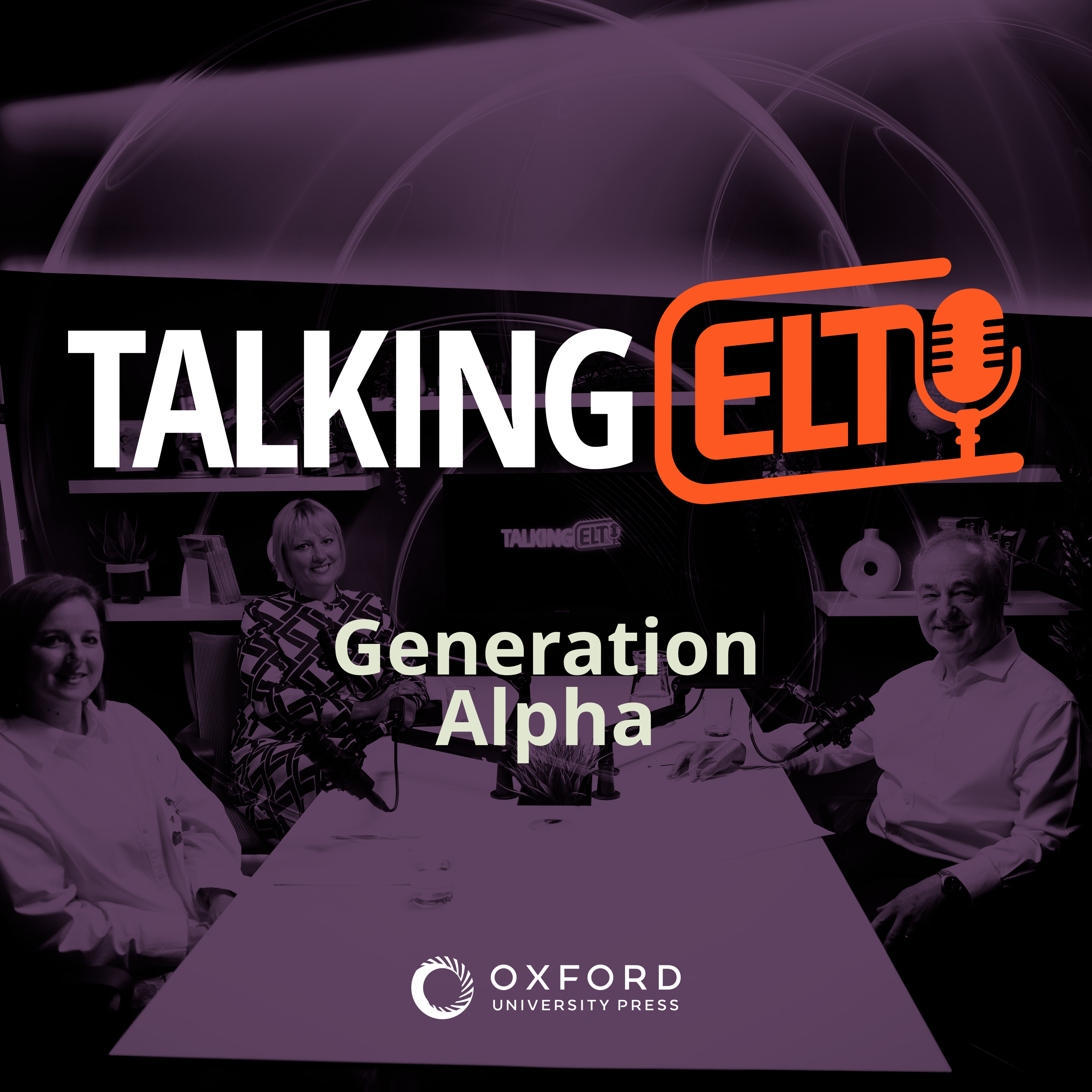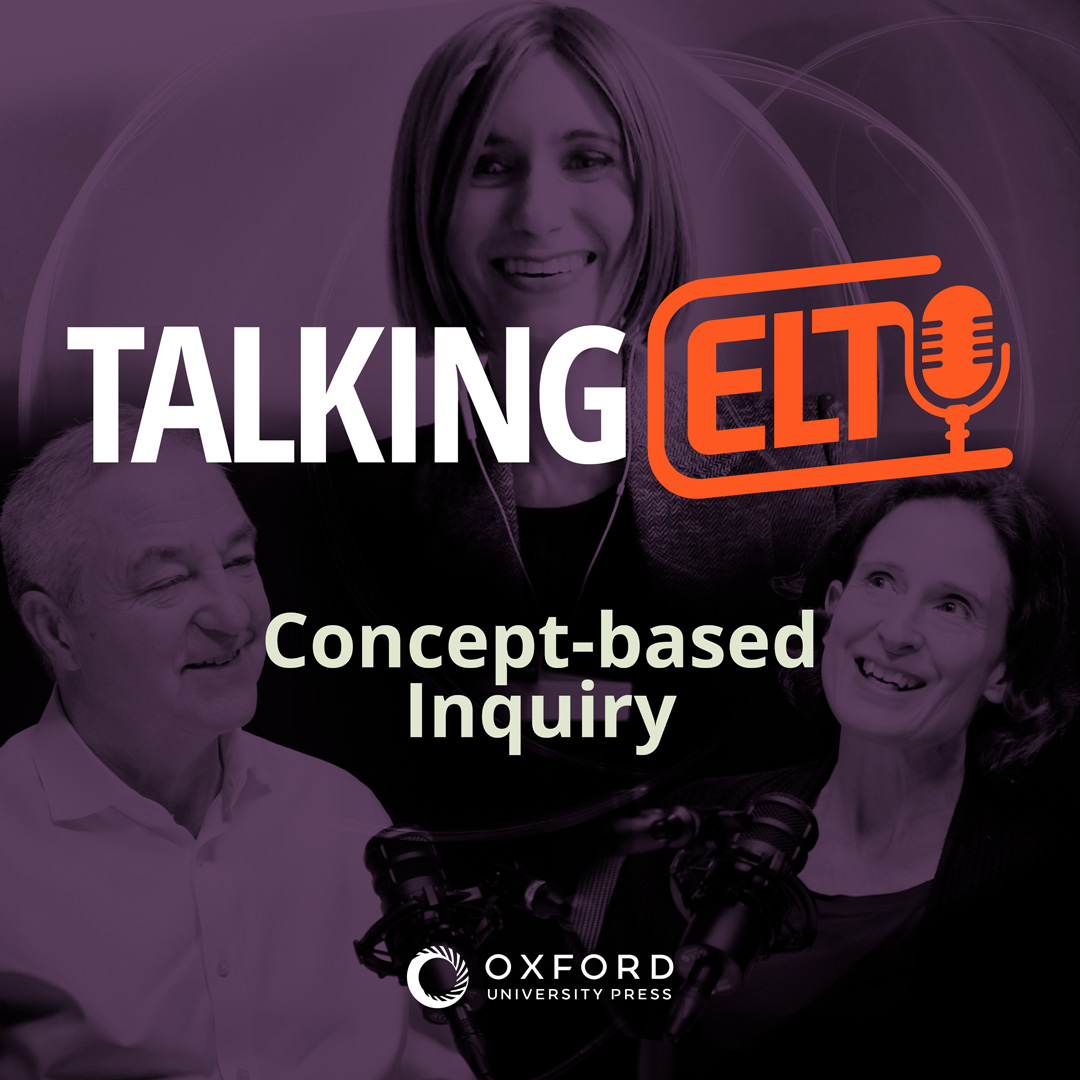Episode Transcript
[00:00:10] Speaker A: Hey everyone, and welcome back to Talking ELT, the easiest place to learn about the big trends in language teaching today. We're continuing our conversation about artificial intelligence with Hierraindeers and Ben Knight.
We've been talking about how AI might impact and change or complement the way we teach, and I want to continue talking about the way it could impact our roles as teachers today.
[00:00:36] Speaker B: We've talked about curation, or we're still in the topic of curation, we've talked about the, what the system of the subject that we're teaching. The second component that we identified was deriving insights about individual learners and where they might fit in and what they might need in terms of the different building blocks at a given moment in time. And that's where another technology that has been around for some time now is suddenly being transformed, and that is learning analytics, of course, or educational data mining, which has been around for probably close to 15 years now in its current form. So we have a lot of insights into how we can identify what groups of learners or individual learners might need at a given moment in time, how they are performing, how they are performing in relation or in comparison to other learners, etc. And well, this is an area where AI is really having a tremendous impact. Going back to what you said earlier, Ben, the use of natural language processing now allows, and I've seen it already being incorporated into a number of learning management systems, allows teachers who have no technical skills in terms of learning analytics, et cetera, to ask everyday questions about their learners in everyday language. So for example, which of my students is really struggling at the moment with topic X? Or how are my learners doing on average compared to Ben's learners who's teaching the same subject? His are doing better. Okay, maybe you and I need to sit down and maybe I can learn something from you. So that is quite exceptional to be able to do that.
[00:02:21] Speaker C: Yeah, I agree that natural language processing interface is going to change it. I think also at the moment we're at the stage where we're using learning analytics to display data, to give data to teachers, and teachers don't have time. So we're not at that useful stage yet. No, but what we're working towards, and we're talking about the kind of medium future, I think of as the automation of interventions. So you don't even need to ask, you don't even need to analyze the data to see who's falling behind. It's already being identified, it's already been responded to, there's already an intervention on the way to those students who need.
[00:03:06] Speaker B: Help or at least an alerting.
There is an important caveat here which I'll come to in a moment. So the system can identify, for example, that if a certain threshold is crossed, let's say that more than 20% of your learners achieve less than X percent on the online quizzes that you set for homework or something, the system can automatically send you a message saying watch out, there's something going wrong, there's something going on. So this automatization is extremely helpful, right? Because you don't as a teacher have to worry about that. Of course the caveat there is that and I'm sure this will be a recurring theme throughout our discussion who sets those thresholds, who decides what that percentage should be and who decides, for example, who should be alerted and in what way. And that's where the human in the loop, which is a term that you're probably familiar with, which is AI processes, but with a human augmentation, if you will, the other way around will remain absolutely vital because, of course, it could.
[00:04:14] Speaker A: Be the person who designs the software. It could be managers, it could be.
[00:04:17] Speaker B: Individual teachers, it could be commercial software developers. It could be done for all sorts of purposes which are not primarily pedagogical. And that of course is where we as teachers have a frontline role to protect our learners and to do what we are here for.
[00:04:36] Speaker A: I think that is really an important point which is worth stressing is that teachers themselves will have a role in shaping the impact of AI the way AI impact our lives.
It needs to be shaped by people who understand the pedagogy and understand the value and understand how to put it to best practice. I guess I think teachers do have quite a large role in that.
[00:05:04] Speaker C: Yeah, I agree. I mean, you see systems which have kind of been developed by engineers and you think, wow, that's probably not the best approach, but it made sense from an engineering point of view. So I remember seeing and it's one of those things I'm always cautious about when people get very excited about personalized learning journeys because I remember seeing something, I think it was a Microsoft university or Microsoft supported university, where there was a lot of work had gone into identifying strengths and weaknesses and guiding students through that. It all made complete sense. And then they showed the university of the future and it was banks of individual students with headphones on sitting in front of screens because it was so individualized they couldn't interact with other people. And you think, wow, that's a dystopian vision of the future.
And obviously with language it's even more so. I think there's always a social element to learning, particularly with language learning. And so I think there's always this balance between personalized and social learning which a teacher will probably be the right person to manage that balance.
[00:06:21] Speaker B: Yeah, exactly. And I think what you're pointing at as well is the fact that of course engineered systems are designed to optimize efficiency, not necessarily effectiveness. And effectiveness is what we decide as a society. Including us as teachers and learners is important. Right? So it might be that you and I having a conversation in class is not the most efficient way for me to develop my pronunciation skills, but it does make me get to know you better. It makes me feel part of the classroom, and it's effective in that sense. It may not be the most efficient way. Right. But that, I think, leads us on to, if I may, to the going back to our distinction between the different jobs, different roles of a teacher. Perhaps that's a nice segue into the delivery side. We've talked about the curation and the preparation, if you will, but now we have a corpus to deliver. Well, what is the role of AI in that phase of the instructional process?
[00:07:22] Speaker A: Well, when it comes to delivery, there's still loads of ground to cover. So why don't we start with the creation and delivery of lessons, materials and activities?
[00:07:34] Speaker C: Obviously with the creation of activity, in some ways the risk here is that AI can generate so much activity, so many texts and activities, that you kind of lose track of what you're trying to do. But I think the exciting thing is really that ability to create learning activities, texts which relate to the interests and needs of particular learners where they are. So I know that sounds like it's going against what I was saying about the caveats around personalized learning, but I think what you're going to find particularly is that there's a core of learning which is very social and joined up, and then there are elements which are customized to particular interests. As a publisher, we constantly face the problem of creating international textbooks with huge amounts of care, going into making those work across a range of different learners.
But actually we know each individual has their own interests and it's quite difficult to meet those individual interests in the future. You can see it being much more much easier to meet those individual interests.
[00:08:47] Speaker B: Yeah, that's a really interesting point because I guess there is a further distinction between materials creation or materials adoption or materials adaptation. And I think if we're leaving aside for a moment the teacher creating their own materials, but if we take the common scenario of a teacher working from a prescribed or selected textbook, for example, then, yeah, you do as an individual teacher have the challenge of making that work in your particular context and for each of the 20 or whatever different individuals in your group. And that's possibly where AI can come in quite handy because it allows you to say, take an activity or text and say, create for me 20 slight variations on this relevant to the individual needs of our learners. And I think that's where as a teacher, you would say, well, that would be quite good because if I don't have to write 20 individual variations of this text saves a lot.
[00:09:47] Speaker C: But I'm also reminded of the challenges of you're in a kind of university context. You've got some students just completely different subjects and even when they get kind of clumped together as engineering, for example, someone who's in chemical engineering is completely different to mechanical engineering. So it's very difficult to fine tune text and activities to individual subject areas in the current approach. But in an AI generated approach, I can see that being much easier.
[00:10:21] Speaker B: Yeah. And that is a real practical benefit, isn't it? And then going back to the topic of materials creation. Yes. On the one hand, there is this wonderful opportunity to have essentially endless lists of materials, resources, activities, et cetera, created. And we see some really interesting plugins and apps, et cetera, appear that allow you to do that. But it does very, very closely link back to the earlier topic of curation, because quality over quantity, effectiveness perhaps over efficiency, you need to balance both. And I think that's where, as an AI ready teacher, so to speak, that's where you have a very important role to play. Right.
For example, at a technical level, the way that large language models work, of course, is that if they base themselves off non factual content, they will produce non factual content. In other words, this acronym GIGO garbage In, Garbage Out, right? It can't do anything meaningful with the original database not containing meaningful content. And I think this is where not to take out the crystal ball too much, but this is where there is, I think, real opportunity for our field to develop contextualized, localized and even personalized AI systems that maybe in some form of hybrid. Allow for a school, an institution, a university or even an individual teacher to curate, collect a set of potentially very large set of materials, but curate it and then apply an AI interface to that to generate from that what you will know to be, or most likely to be, good quality activities or resources.
[00:12:41] Speaker C: Yeah, it's interesting also, because it comes a little bit back to the corpus conversation earlier.
We are talking about learning English to communicate with other people who probably don't speak English, the first language either. So for the majority of people, that's the context in which they're learning English, trying to deculturalize a lot of the language that they're learning at the moment is quite difficult. But I can imagine language learning models, sorry, large language models being created which are not UK biased, US biased, but are really using language that is taking language built on language, which is used between second language speakers of English.
[00:13:35] Speaker B: Yeah.
And that is where you see, we talked earlier about unanticipated opportunities, we've talked for decades now about English as a lingua franca. And well, maybe this will allow the emergence of a it could be called a global dialect, a global act, which is quite a new term here, dictionaries here. It's going to go in there, the next one, right? Yeah. And that's where the real excitement comes in, because it builds on the incredible capabilities of this conglomerate of technologies called AI that we refer to as AI, but with a human in the loop. And I think if you do put these two things together, there is some real magic to be created.
[00:14:25] Speaker A: Thanks for listening to this episode of Talking ELT, the easiest place to learn about the big issues in language teaching. Don't forget to like and subscribe if you want to learn more about this issue and others like it. We look forward to seeing you next episode.


